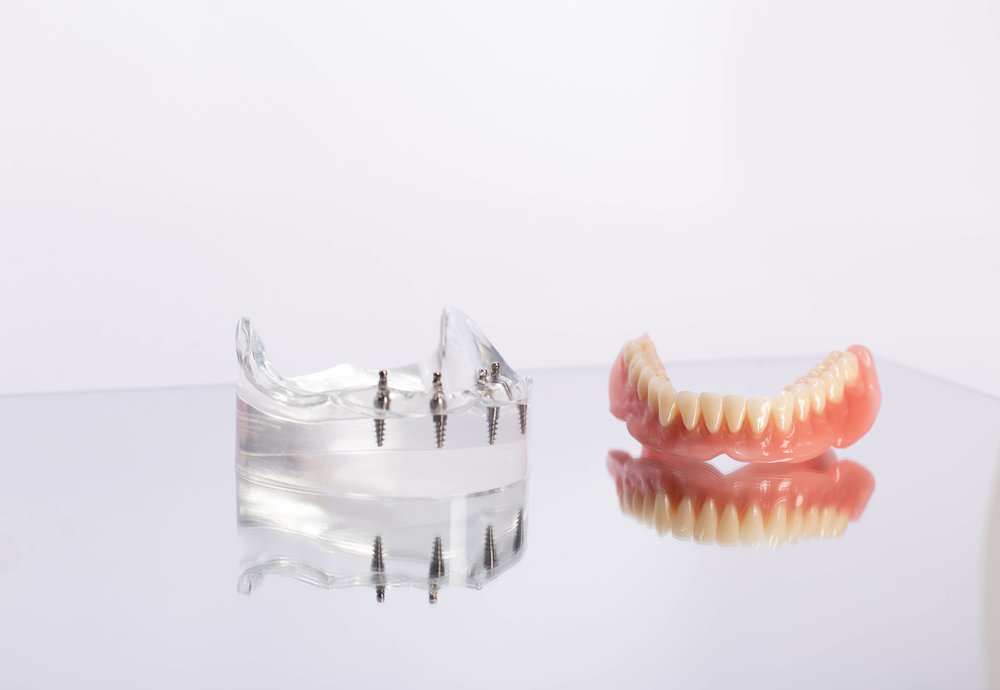If you’re missing teeth, you’re likely exploring your options — and two of the most common solutions are dental implants and dentures. Both restore function and appearance, but they differ significantly in durability, comfort, cost, and long-term health benefits.
In this guide, we’ll break down the pros and cons of dental implants vs. dentures to help you decide which option is best for your smile and lifestyle.
What Are Dentures?
Dentures are removable appliances designed to replace missing teeth. They come in two main types:
- Full dentures – replace all the teeth in the upper or lower jaw
- Partial dentures – replace a few missing teeth and are anchored to existing natural teeth
Dentures rest on the gums and are typically made of acrylic or a combination of acrylic and metal.
What Are Dental Implants?
Dental implants are tooth replacements anchored directly into the jawbone. A titanium post acts as a tooth root, and a crown is placed on top to mimic the look and function of a natural tooth.
Implants can be used to replace a single tooth, several teeth, or even support a full arch of teeth (known as implant-supported dentures or All-on-4 systems).
Comparing Dental Implants and Dentures
Appearance and Comfort
- Implants: Feel and function like natural teeth. They’re stable, fixed in place, and blend in seamlessly.
- Dentures: Modern dentures look more natural than ever, but they can shift, cause sore spots, and require adjustment over time.
Stability and Function
- Implants: Offer strong bite force and allow you to eat most foods comfortably. No slipping or adhesives needed.
- Dentures: May move during eating or speaking. Sticky foods or harder textures can be challenging.
Longevity
- Implants: With proper care, implants can last 15–25+ years, often a lifetime.
- Dentures: Typically need to be replaced or relined every 5–7 years.
Bone Health
- Implants: Stimulate the jawbone and help prevent bone loss.
- Dentures: Do not support the jawbone, and bone loss can progress over time, affecting fit and facial structure.
Maintenance
- Implants: Cared for like natural teeth — brush, floss, and visit your dentist regularly.
- Dentures: Require daily removal, soaking, and cleaning. Need to be handled carefully to avoid damage.
Cost
- Implants: Higher upfront cost, but longer-lasting and often more cost-effective over time.
- Dentures: Lower initial cost, but may incur more maintenance and replacement expenses over the years.
Which Option Is Right for You?
Here are a few factors to consider:
| Factor | Dental Implants | Dentures |
| Missing one or a few teeth | ✅ | ✅ (partial) |
| Missing all teeth | ✅ (All-on-4, implant-supported dentures) | ✅ |
| Concerned about bone loss | ✅ | ❌ |
| Looking for a permanent solution | ✅ | ❌ |
| Budget-friendly option needed | ❌ (higher initial cost) | ✅ |
| Willing to undergo surgery | ✅ | ❌ |
| Prefer non-removable teeth | ✅ | ❌ |
Can You Combine Implants and Dentures?
Yes! Implant-supported dentures offer the best of both worlds. They’re more stable than traditional dentures and require fewer implants than replacing each tooth individually. This option is ideal for patients who want improved function without a full mouth of individual implants.
Talk to a Reno Dentist About Your Options
At Futch Dental in Reno, NV, we specialize in helping patients choose the right tooth replacement option for their needs, goals, and budget. Whether you’re interested in implants, dentures, or a combination of both, we’ll walk you through your choices and design a treatment plan that restores your confidence and your smile.
Schedule a consultation today to learn more about dental implants vs. dentures.



